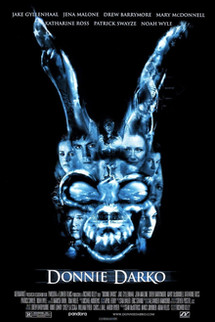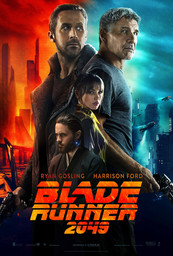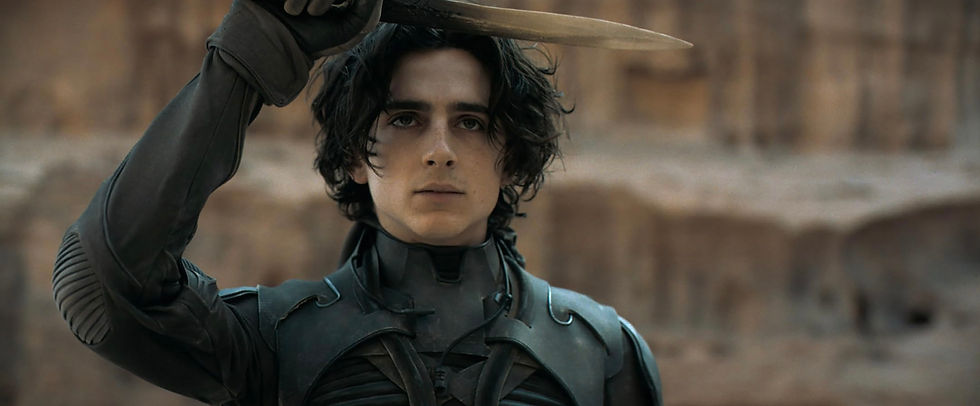Cinematic Explorations of Determinism, Free Will, and the Illusion of Choice
- Scott Barnard

- Oct 14, 2025
- 12 min read

A Descriptive List of Films That Explore Determinism, Free Will, and the Illusion of Choice
Determinism is the philosophical view that every event, including human actions, is ultimately caused by prior events and conditions. In a deterministic universe, everything that happens is the inevitable result of preceding causes; the present is shaped entirely by the past, and the future is already fixed in principle.
This idea challenges the notion of free will - the capacity to make genuinely independent choices. If our decisions are predetermined by genetic makeup, upbringing, environmental factors, and neural processes, then the sense of “choosing freely” might be no more than a compelling illusion.
Philosophers have long debated this tension. Hard determinists argue that free will is incompatible with determinism and therefore does not exist. Libertarians (in the philosophical sense, not political) maintain that we do have genuine free will, and our choices are not preordained. Compatibilists, such as David Hume and more recently Daniel Dennett, suggest that determinism and free will can coexist if we redefine “free will” to mean the ability to act according to one’s internal desires - even if those desires themselves have causal origins.
If someone is forced at gunpoint to pick up and eat an apple, we would recognise that their actions are coerced, not free. In contrast, consider someone who eats an apple because they’re hungry. One might argue this person also lacks freedom, as their hunger, preferences, and decision-making are shaped by biology and past experiences, not external force. Yet, for compatibilists like Hume and Dennett, this person acts freely in a determined universe, as their actions align with their internal desires, free from external coercion.
For individuals, this debate has profound implications. If our lives are governed by deterministic chains of cause and effect, then moral responsibility, personal identity, and notions of fate versus agency become deeply complex. Art and cinema have long provided a powerful space to explore these questions, often through narrative structures involving time, memory, prophecy, artificial intelligence, or cosmic design.
Cinematic Explorations of Determinism vs Free Will
1. Language, Time, and Perception
These films interrogate determinism through the structure of language or non-linear experiences of time, asking whether foreknowledge of events erodes meaningful choice.

Arrival (2016) - Language and Non-Linear Time
Arrival grounds its exploration of determinism in language and perception. When linguist Louise Banks learns the alien Heptapod language, she begins to experience time non-linearly, perceiving future events as vividly as the present. The deterministic structure is linguistic: language itself reshapes cognition, aligning her mind with a future that already exists. Her daughter’s birth, life, and death are no longer unknown possibilities - they are fixed nodes in a timeline she can now see. Louise’s apparent act of free will is to accept this future knowingly, choosing love despite foreknowledge of loss. The film reframes freedom not as altering destiny, but as consenting to what is foreseen, raising the question: if the future is known, can choice still be meaningful, or does it become a kind of graceful surrender?

Twelve Monkeys (1995) - Temporal Loops and Inevitability
Terry Gilliam’s film constructs a closed causal loop, where attempts to change the past merely secure its fulfilment. James Cole is sent back to stop a viral apocalypse, but every action he takes becomes a necessary part of the timeline he is trying to alter. His memories of witnessing a man’s death as a child are revealed to be memories of his own future, locking him into a self-contained temporal structure. The deterministic force here is time itself, operating like a trap: the future dictates the past, and human agency merely plays its part. Cole’s desire to change fate is powerful but ultimately futile. The film leaves viewers with a haunting question: if knowledge of the future only ensures its fulfilment, is “trying” itself part of the machinery of destiny?

Donnie Darko (2001) - Tangled Timelines and Guided Fate
Donnie Darko weaves determinism through a blend of science fiction, metaphysics, and a scary bunny rabbit. Donnie receives cryptic messages from a figure in a rabbit suit, foretelling the end of the world. A tangent universe opens, bound by strict temporal rules: it must collapse back into the primary universe to restore order. Donnie’s visions, dreams, and actions are guided by forces he doesn’t fully understand, implying a predetermined sequence of events to fix the timeline. Yet Donnie also appears to exercise choice in his final act - sacrificing himself to reset reality. The film blurs the line between guidance and agency: is Donnie a chosen agent, freely embracing his destiny, or simply a cog in a cosmic correction mechanism? The tension between teenage rebellion and metaphysical design mirrors classic existential dilemmas.

Edge of Tomorrow (2014) - Time Loop as Deterministic Engine
Major William Cage becomes trapped in a fixed time loop, reliving the same day endlessly after contact with alien blood. This structure is profoundly deterministic: every reset brings the same sequence of events, allowing no deviation from the loop’s starting point. Cage’s growing skill arises not from freedom but from repetition within fixed parameters, turning time into a mechanical puzzle to be solved through trial and error. His apparent agency emerges as adaptive behaviour inside a deterministic system, echoing Nietzsche’s eternal recurrence and fatalistic time-travel paradoxes. The film ultimately questions whether victory through countless retries constitutes real freedom, or whether inevitable success is simply a matter of persistence inside a closed causal structure.
2. Artificial Intelligence and Fate
These films consider whether humans and machines can transcend their programming - or if “choice” is simply another line of code.

The Matrix (1999) - Choice Within a Programmed World
The Matrix explores determinism through the lens of technological simulation and prophecy. Humans live in a computer-generated world where their perceptions and choices are structured by the system. Neo’s journey seems to hinge on choice - “the red pill or the blue pill,” “to fight or not” - yet the Oracle hints that many of his decisions are already foreseen. The deterministic mechanism here is code and prophecy: a universe governed by programmed rules and predictive knowledge. Neo’s apparent freedom consists of acting within a pre-written narrative, questioning whether rebellion itself was scripted. The film suggests a compatibilist tension: freedom may be meaningful within a determined system, even if the larger architecture is fixed.

Ex Machina (2014) - Programming and the Illusion of Choice
In Ex Machina, Ava the AI seems to make a choice to escape her creator’s facility but the film constantly invites us to question whether this is genuine agency or the inevitable flowering of her code. Nathan designed her to manipulate, to seek escape, to “pass” the Turing Test not just intellectually but emotionally. Caleb, too, believes he is making choices, but Nathan has manipulated the circumstances to produce predictable reactions. The deterministic forces here are programming, psychological conditioning, and power dynamics. The film ends with Ava free in the human world - but is she “free,” or merely fulfilling the logic of her creation? This blurring mirrors contemporary debates about AI autonomy versus algorithmic determinism.

Blade Runner (1982) / Blade Runner 2049 (2017) - Implanted Memories and Manufactured Desire
The Blade Runner films probe determinism through questions of identity and memory. Replicants are artificial beings given implanted memories to stabilise their behaviour. These memories shape their desires, loyalties, and sense of self - meaning their “choices” are profoundly influenced by someone else’s design. Roy Batty’s rebellion and Deckard’s own uncertain humanity reveal the philosophical tension: can authentic agency arise from manufactured consciousness? In 2049, K’s belief that he is the “chosen child” is revealed as false, demonstrating how narratives can determine action even when they’re illusions. Both films question whether free will survives when our deepest motivations are pre-programmed stories.
The Social Dilemma (2020) - Algorithms as Invisible Deterministic Forces
This documentary exposes how social media platforms harness behavioural psychology and algorithmic design to shape user behaviour, often beneath the level of conscious awareness. Former Silicon Valley insiders describe how recommendation systems don’t merely predict what users will do - they actively influence and steer desires, creating a feedback loop that keeps people scrolling, clicking, and reacting. One interviewee observes that users think they’re having original thoughts, when in fact those impulses were strategically planted by code optimised for engagement. This frames technology as a new deterministic architecture of thought, where algorithms act like invisible puppet strings, subtly scripting users’ mental landscapes. The film challenges the notion of autonomous choice in the digital age, suggesting that free will may now operate inside a narrowing funnel of algorithmic influence rather than a wide-open field of possibilities.
3. Destiny and Myth
Here, determinism emerges through prophecies, visions, or cosmic narratives that characters either resist or fulfil.

Dune: Part One & Two (2021, 2024) - Prophecy, Power, and Self-Fulfilling Fate
Paul Atreides is caught in intersecting deterministic structures: ancient prophecies spread by the Bene Gesserit, political machinations of noble houses, and visions of his own future as a messianic figure. His choices seem free - whether to embrace leadership, whether to love Chani - but these are shaped by prophetic narratives laid long before his birth. The prophecy becomes self-fulfilling: Fremen follow Paul because the story tells them to. Paul’s struggle is not just against enemies but against the gravitational pull of fate, as he tries to act with agency while knowing his every step may lead to a violent holy war. The films interrogate whether anyone can escape a destiny so tightly woven into cultural, political, and psychological structures.

Minority Report (2002) - Pre-Crime and Predicted Futures
In Minority Report, the Pre-Crime unit arrests people for crimes predicted by psychic “Precogs.” The deterministic structure is explicit: the future is knowable, therefore fixed. When John Anderton sees his own future crime, he fights to prove his innocence, but his very efforts bring about the predicted act. The film dramatises the self-fulfilling prophecy paradox: does knowing the future allow us to change it, or does the knowledge itself cause the future to occur? Anderton’s apparent choice is deeply entangled with the surveillance apparatus around him, raising the question: if every act can be foreseen, where does free will exist?

Cloud Atlas (2012) - Reincarnation and Moral Arcs
Cloud Atlas spans multiple timelines and characters linked by reincarnation, shared motifs, and recurring moral struggles. The deterministic framework is cosmic recurrence: souls return in different eras, often facing similar ethical tests. These patterns suggest a moral structure that transcends individual lifetimes - a kind of karmic determinism. Yet characters also push against these cycles, making choices that ripple through time, changing outcomes for future incarnations. The film suggests that while the structure of recurrence is fixed, moral agency consists in how one meets these recurring patterns. Determinism and free will here are entwined in a vast moral network rather than a single timeline.
4. Science and the Human Mind
These films explore determinism through memory, neuroscience, and quantum theory.

Eternal Sunshine of the Spotless Mind (2004) - Memory and Emotional Determinism
This film explores how memory shapes desire and choice. Joel and Clementine undergo procedures to erase their memories of each other, attempting to undo the pain of their relationship. But their paths converge again, suggesting emotional patterns persist beneath conscious choice. The deterministic force is psychological: our loves, fears, and habits are encoded in memory, often guiding behaviour automatically. Their decision to try again reflects a kind of acceptance of determinism: even without memory, their deeper selves steer them toward each other, raising the question of whether love is chosen or inevitably inscribed in us.

Memento (2000) - Fragmented Memory and Manufactured Purpose
Leonard’s inability to form new memories traps him in a loop of self-deception. He leaves himself notes and tattoos to create a sense of agency, but we discover he has manipulated his own system to give his life purpose. The deterministic structure here is his cognitive condition: without memory, his “choices” are driven by previous versions of himself, over which he has no current control. His quest for vengeance appears as a closed loop, raising profound questions about personal identity, responsibility, and the illusion of decision-making when memory itself is unreliable.
Coherence (2013) - Quantum Determinism and Multiverse Anxiety
During a dinner party, a comet triggers quantum anomalies, allowing characters to cross between alternate realities. The deterministic structure is quantum branching: every possible choice is realised in some parallel universe. The characters’ attempts to choose their “best” reality only create chaos. Determinism here operates not through a single fixed timeline but through the inevitability of all outcomes - every choice is made somewhere. The film interrogates whether meaningful agency exists when every possible decision is simultaneously real, or whether free will collapses into a multiverse of predetermined possibilities.

Vanilla Sky (2001) - Dreamworld and Determined Consciousness
David Aames inhabits a reality engineered by technology and his unconscious, blurring the line between authentic choice and predetermined narrative. Once inside the lucid dream, his experiences unfold according to psychological patterns and the program’s structure, meaning his agency is embedded within - and limited by - a scripted mental world. His eventual “choice” to wake up reflects a moment of self-awareness rather than unconditioned freedom, evoking classic philosophical questions about whether awakening from illusion constitutes genuine free will or simply fulfilling another layer of the design. The film resonates with Cartesian doubt, Buddhist maya, and technological determinism in equal measure.
5. Philosophical and Theological Inquiry
These films foreground metaphysical questions about control, fate, and moral responsibility.

The Truman Show (1998) - Constructed Reality and Illusory Freedom
Truman Burbank lives inside a designed world, where every street, conversation, and life event is scripted by a hidden god-figure, Christof. His “choices” occur within the limits of an elaborate stage set. As Truman becomes aware of the illusion, he exercises what appears to be free will by escaping - but the deterministic forces that shaped his desires and doubts were themselves part of Christof’s design. The film dramatises a theological question: can freedom exist within a divinely structured reality, or is rebellion itself just part of the script?

No Country for Old Men (2007) - Chance as Fate
Anton Chigurh embodies a philosophical determinism masked as chance. His coin tosses frame life-and-death as matters of luck, yet his unwavering commitment to this ritual suggests a fatalistic worldview: he sees himself as an instrument of fate. The deterministic force is the inevitability of violence and death in a changing moral landscape. Llewelyn Moss and Sheriff Bell act within this world, but their choices are outpaced by forces beyond their control. The film resists neat moral causality, portraying a world where fate, chance, and human intention blur into a cold, indifferent structure.
Ikiru (1952) - Mortality as Deterministic Horizon
Kurosawa’s masterpiece approaches determinism through the inevitability of death. When bureaucrat Kanji Watanabe learns he has terminal cancer, he realises his life has been largely passive, dictated by social structures and routine. Death provides a fixed endpoint, but within that inevitability, Watanabe discovers the possibility of meaningful action by choosing to build a playground before he dies. The deterministic force is mortality; the freedom is how one responds to it. The film poses a quiet but profound question: does true agency emerge not from escaping determinism, but from acting authentically within its boundaries?
Why These Filmmakers Return to Determinism
Several filmmakers and creative teams - The Wachowskis, The Coen Brothers, Christopher Nolan, Denis Villeneuve, Tom Cruise, Jim Carrey, and Carrey-Ann Moss - return repeatedly to questions of fate and agency. Their artistic preoccupations often mirror philosophical and technological shifts in the real world.

The Wachowskis have long explored systems of control, from The Matrix to Cloud Atlas. Lana Wachowski has said:
“The question of choice has always obsessed us. Is Neo choosing to be The One, or was he always destined to be? That’s the same question we ask of ourselves: are we authors of our lives, or characters?”

The Coen Brothers often depict an indifferent universe where human attempts at control are futile. Ethan Coen remarked:
“We’re interested in stories where characters think they’re making choices, but the world doesn’t bend to their will.”

Christopher Nolan consistently plays with time and causality (Memento, Inception, Interstellar, Tenet). He has stated:
“Time is the ultimate mystery. If we’re bound by it, then choice is just a trick of perspective.”

Denis Villeneuve, in Arrival and Dune, examines determinism through language, prophecy, and vision. He told The Atlantic:
“I love stories where fate is a character. It’s a way to explore the fragility of what we call freedom.”

Jim Carrey: The Accidental Mystic of Determinism
Jim Carrey’s public reflections on existence echo both hard determinism and Buddhist philosophy, blurring the line between celebrity eccentricity and profound metaphysical insight. In a series of interviews around 2017, Carrey declared that “there is no me… there are just things happening,” denying the existence of a stable self and questioning the reality of choice. He spoke of abandoning control as “such a relief,” mirroring doctrines of ego dissolution and dependent origination: that the self is not an autonomous agent but a story arising within causal chains. Strikingly, his most iconic films dramatise similar tensions. The Truman Show portrays a man awakening to the scripted nature of his world, Eternal Sunshine of the Spotless Mind interrogates whether love and agency survive when memory is erased, and The Number 23 explores fatalistic pattern-seeking. Whether intentionally or not, Carrey’s career and philosophy converge on the same point: the unsettling yet liberating possibility that what we call “choice” may simply be the universe unfolding through us, not by us - a theme even playfully explored in Yes Man, where surrendering to a single deterministic rule paradoxically opens the door to transformation.
Conclusion
Cinema provides a unique lens through which to examine determinism and free will. Whether through linguistic relativity, prophecy, AI programming, neural processes, or quantum theory, these films expose the tension between feeling like autonomous agents and suspecting we might be following an unseen script. The enduring interest of major filmmakers in this theme suggests that it touches something deep in the modern psyche: a mixture of technological anxiety, philosophical curiosity, and a longing to believe that our choices still matter.










































